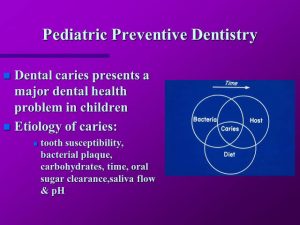We are all well aware that the health of teeth, as well as of the whole organism as a whole, largely depends on how and under what conditions their laying, development and final formation took place. Already in the first two months of intrauterine life, the organs of the maxillofacial region begin to form and begin to form, at the 6-7th week a dental plate (future milk teeth) forms at the embryo, and at the 5-7th month the formation, mineralization of crowns deciduous teeth and permanent tabs. Ossification of the jaws is observed towards the end of the first year of life, while the final maturation of the bone occurs only at the age of 25.
Click Here: Dental Implants San Diego
From the moment a child is born to 17-18 years, the development process goes on continuously and the more peculiar and intensive, the smaller the child. What kind of methods for the prevention of oral diseases depends on the nature and intensity of changes in the body? It is customary to distinguish the following periods of development of children:
- intrauterine development – 280 days;
- newborns – about 2.5-3.5 weeks;
- chest – up to 1 year;
- preschool – from 1 year to 3 years;
- preschool – from 3 to 7 years;
- school – 7-18 years old:
- primary school – 7-10 years old
- secondary school (prepubertal) – from 10 to 12-13 years
- senior school (puberty, puberty) – from 12-13 to 18 years

The chemical composition and structure of tooth enamel are largely determined in the prenatal period. At this time, hereditary factors play a large role in the occurrence of any anomalies, but the common diseases of the expectant mother, her diet and psychological state are also important. In the first year of life, the formation and mineralization of deciduous teeth continue and the mineralization of permanent teeth begins. Various diseases of children, in which water-salt metabolism is impaired, affect the structure of hard tissues of the tooth and may be the reason for their systemic underdevelopment and low resistance to caries.
In pre-school and preschool periods, caries and its complications are most often detected in children, the development of which directly depends on oral hygiene, diet and the general health of the child. It is known that decay of deciduous teeth can occur already in the first 2 years of a child’s life, while the incidence of caries increases quite rapidly. Therefore, measures to prevent caries should be carried out as early as possible, in fact, from the moment of eruption of the first tooth. In addition to caries and its complications, schoolchildren often have gingivitis, and in the absence of preventive measures, early detection and systematic dental treatment – deeper lesions of periodontal tissues. During these periods of the child’s development, regular visits to the dentist are of great importance for the prevention and early detection of dental diseases, because at this time the formation of permanent dentitions, their ratio, the entire maxillofacial apparatus, and, therefore, the aesthetics of the smile.
The introduction of a child to hygiene skills, both general and special, is the key to his health. After all, we know very well that it is better to prevent the disease than to treat it. Oral diseases are often infectious in nature, therefore hygiene in the prevention of dental diseases is of great importance. In order for a child to fully carry out hygiene procedures, it is necessary to teach him specific skills, develop a conscious attitude towards hygiene as the main means of preventing diseases. In addition, the data of the studies confirm the insolvency and low efficiency of self-brushing in children 5-7 years of age. Therefore, an important condition for adequate hygiene is the active participation of parents in brushing their teeth. First, it is the brushing of a child’s teeth by adults, while older children have an active control over brushing. It should be noted that the instillation of proper oral hygiene skills is greatly influenced by a personal example from parents. It is very important to teach children to floss from an early age, since in our time there is a very high percentage of caries on the contact surfaces of the teeth, which is the result of an uncleansed plaque from the interdental spaces. It is necessary to immediately instill the correct oral hygiene technique, which the dentist can help: we will be happy to tell and show how to brush our teeth for both children and adults.
Among other things, the doctor’s arsenal includes professional tooth brushing, various methods of fluoridation of enamel, sealing fissures of newly erupted permanent teeth and other preventive procedures that require minimal emotional, time and material costs and at the same time are most effective in terms of preserving teeth. Be alert to your health and the health of your children, and we, in turn, are always ready to help you.
Click Here: https://versaillesdentalclinic.com/services/hollywood-smile-dubai/
 Bloggers Trend Keeping You Up To Date
Bloggers Trend Keeping You Up To Date
